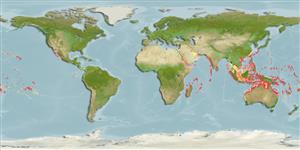Common names from other countries
>
Perciformes/Scorpaenoidei (Scorpionfishes) >
Scorpaenidae (Scorpionfishes or rockfishes) > Scorpaeninae
Etymology: Scorpaenodes: Latin, scorpaena = a kind of fish, 1706 + Greek oides = similar to (Ref. 45335).
Environment: milieu / climate zone / depth range / distribution range
Ecologia
marinhas associadas(os) a recifes; intervalo de profundidade 3 - 49 m (Ref. 9710). Tropical; 30°N - 32°S
Indo-Pacific: Red Sea to the Marquesan and Tuamoto islands, north to the Ryukyu and Hawaiian islands, south to Lord Howe Island.
Tamanho / Peso / Idade
Maturity: Lm ? range ? - ? cm
Max length : 14.0 cm TL macho/indeterminado; (Ref. 9710)
Espinhos dorsais (total) : 13; Raios dorsais (total) : 8 - 10; Espinhos anais: 3; Raios anais : 5 - 6. Interorbital area and snout scaled; small spines at midline between tympanic spines frequently present; interorbital spines present; extra spines usually present on upper rear margin of eye after supraocular spine; dorsal spine, usually non longer than orbit diameter; body often covered with small skin flaps (Ref. 10482). Distinguished from other species of Scorpaenodes by having suborbital ridge with more than 5 spinous points, usually with 10 or more in adults (Ref. 10482).
Inhabits areas of rich coral growth from near shore to the outer reef slope (Ref. 4313). Benthic (Ref. 58302). Cryptic. Venomous spines (Ref. 4313). Minimum depth reported taken from Ref. 30874.
Ciclo de vida ou comportamento de acasalamento
Maturities | Reprodução | Spawnings | Egg(s) | Fecundities | Larvas
Eschmeyer, W.N., 1986. Scorpaenidae. p. 463-478. In M.M. Smith and P.C. Heemstra (eds.) Smiths' sea fishes. Springer-Verlag, Berlin. (Ref. 4313)
Status na Lista Vermelha da UICN (Ref. 130435)
CITES (Ref. 128078)
Not Evaluated
Uso pelos humanos
Pescarias: espécies comerciais; Aquário: Espécies comerciais
Ferramentas
Relatórios especiais
Baixar XML
Fontes da internet
Estimates based on models
Preferred temperature (Ref.
115969): 24.5 - 28.9, mean 27.5 (based on 590 cells).
Índice de diversidade filogenética (Ref.
82804): PD
50 = 0.5000 [Uniqueness, from 0.5 = low to 2.0 = high].
Bayesian length-weight: a=0.01549 (0.00905 - 0.02650), b=3.05 (2.90 - 3.20), in cm Total Length, based on LWR estimates for this species & (Sub)family-body (Ref.
93245).
Nível Trófico (Ref.
69278): 3.6 ±0.59 se; based on food items.
Resiliência (Ref.
120179): médio(a), tempo mínimo de duplicação da população 1,4 - 4,4 anos (Preliminary K or Fecundity.).
Fishing Vulnerability (Ref.
59153): Low vulnerability (10 of 100).
